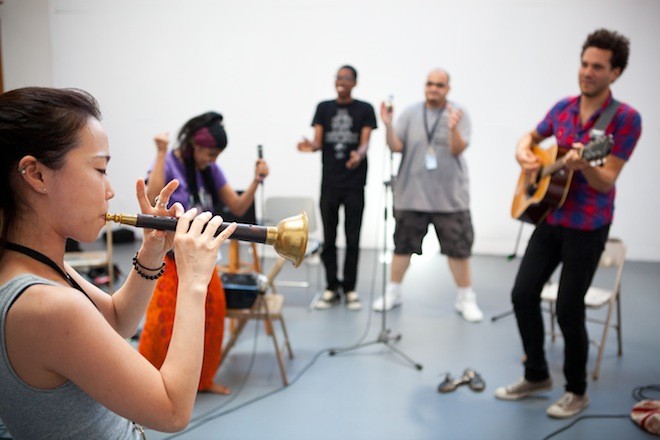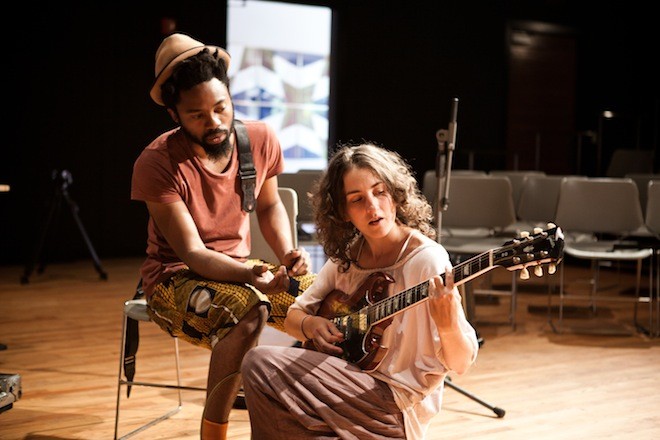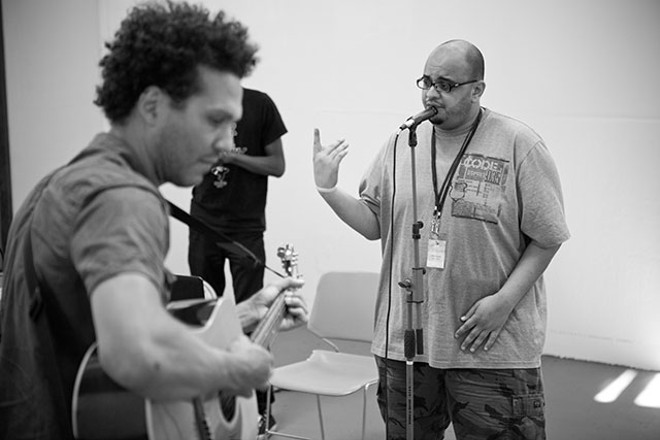The world often associates New Smyrna Beach with shark attacks, but don’t tell our esteemed musical guests, the OneBeat class of 2013 – especially not guitarist Yang Fan, who when asked what she liked best about her visit to Florida (so far) immediately answered, “The beach.” Then again, this is an artist who at 15 started the first-ever all-girl Chinese punk band, Hang on the Box, so she’s not exactly the fearful sort.
But she’s not here to work on her tan. Yang Fan was selected to become part of this year’s iteration of OneBeat, an collaborative music project that pulls together global artists from diverse musical backgrounds (25 musicians from 16 countries) seeking to compel creative fusions of both music and culture.
“This group is just amazing, really diverse,” says OneBeat founder and co-director Christopher Marianetti. “There are a lot of really interesting artists, some of them at the forefront, very famous, and doing really popular or semi-popular kinds of things. And then there are artists just totally pushing the boundaries within their genre.”
When the artists first arrived at the Atlantic Center for the Arts for their two-week sabbatical, they were treated to a workshop led by collaborating artist Mark Stewart, an instrument designer who has worked with Bob Dylan, Paul McCartney, Bruce Springsteen and others. Stewart helped the group create new instruments, and these were the only means they had to make music during their initial group sessions. Imagine – with artists from Kenya, Venezuela, Russia, Cambodia – being so far from home and without even your instrument as a security blanket when introducing yourself to some of the world’s most imaginative musicians.
For some devoted to traditional instruments, like South Korean composer Jiha Park, it was an opportunity to flex new muscles. For others, it was probably closer to second nature – for instance, New Orleans jazz band leader Aurora Nealand, who recently toured Switzerland with an ensemble called Liquid Land, utilizing unconventional instruments handcrafted from New Orleans trash. Either way, this teasing introduction to what each artist was capable of likely could not predict the immediate electricity that follows the day each artist is reunited with his or her instrument of choice, whether a bass guitar or an oud, and given license to show off.
The mutual excitement that morning is palpable. The musicians were divided into four ensembles, curated by the OneBeat staff. As a means of getting to know each other musically, one person in each group teaches the others one of their own songs. Language barriers aside, the rooms are full of patient and inquiring eyes, not making eye contact, but mostly staring intently at each other’s fingers.
Related Gallery:
Click the photo to launch a slideshow to see more of the musicians of OneBeat.

In one room is a jazzy electronic pop vibe (led by Nigerian guitarist Biodun Kuti and accentuated intriguingly by Kenyan songwriter Bill Sellanga); in another, a soaring post-rock soundscape initiated by South African guitarist Mpumelelo Mcata, colored with mesmerizingly cool soprano vocals by Czech singer Lucie Páchová and misted by keys provided by U.S. songwriter Nandi Plunkett (of the band Half Waif) on piano and Lebanese audio-visual artist Elyse Tabet on an electronic keyboard. But in both rooms the same slow, deep nods are paired with enthusiastic grins at the precise moment when the confusion clears and the composition is free to break out on its own. This was something more cerebral than simply jamming, and more invigorating than half the stuff you hear on Pitchfork.
And it was only the first day of working together in a functional environment. Marianetti partially attributes this to the setting, which is why they returned to Atlantic Center for the Arts for a second year.
“This place is unbelievable,” Marianetti says. “The space is really magical. You’re living in a place where nature and architecture really meld together, and it’s really a beautiful thing. Everybody who comes here is really amazed.”
When the musicians stop for lunch, in the social cafeteria setting, you see some artists naturally keeping with their ensemble group to continue the conversation outside the classroom; others gravitate toward personalities they already seem to really gel with. An observer can already get a sense of who might collaborate later on, when they get to choose who they work with (after the second set of ensembles, chosen at random). Marianetti explains his theory that the communication skills they develop in the assigned groups will help strengthen the more organic collaborations to propel satisfying arrangements and what he anticipates to become lifelong music-writing relationships: a small step in his larger goal of maintaining a worldwide community of musicians.
“It feels like this is really the future in a sense, and not just in assembling musicians and pushing the boundaries of music-making but also in thinking of the global, political sense,” Marianetti says. “We have people here who are really doing things in their countries. We have an Egyptian rapper who was at the forefront of talking out about the revolution. He said some things last night that you could tell was just blowing people’s minds.”
Perhaps the best way to prepare for Friday’s show is by listening to last year’s OneBeat mixtape (foundsoundnation.org/2012-mixtape). OneBeat is one of several projects under the umbrella of Found Sound Nation, an artists collective that seeks to leverage music to strengthen communities. The OneBeat project includes a musicians residency program and then a two-week tour made possible by assistance from the U.S. Department of State’s Bureau of Educational and Cultural Affairs, which is why so many musicians of different nationalities can come into the U.S. to meet and perform without complications.
The rapper Marianetti was speaking of is Ahmed Rock, a pioneer of hip-hop in Egypt, who consciously simplifies his raps in order to deliver his messages about the revolution clearly to the largest audience possible. He and his collective, Revolution Records, use a portable studio to record, produce and engineer their music, but at this moment, he’s in the painting studio at the Atlantic Center for the Arts making beats to back the incredibly powerful vocal of Indian singer Malabika Brahma, whose voice is so strong, it shakes those in attendance to stunned tears. Yang Fan is on guitar. Jiha Park is on the taepyeongso, a Korean oboe that rivals Brahma’s intensity in pitch. The only natural correlation between preferred genres of any musician in the room is that Ahmed Rock is joined by an underground New York MC, YC the Cynic. What they’re creating is definitely hip-hop, but it’s certainly not hip-hop we’ve heard before.
Over in the theater, Mcata passes leadership responsibilities over to New York bassist Greg Chudzik, who has contributed to releases on labels like 4AD and Jagjaguwar. His complicated bass lines are difficult at first to relay to the fresh ears around him, and the question of whether the artists should be learning the songs exactly or interpreting the songs more liberally arises. The choice is theirs, of course, but in a room full of leaders, any one is capable to take charge. While he explains, Venezuelan drummer Omar Amado leans on a tambora while seated at a more modern drum kit. (It should be noted that the equipment that clutters these spacious studios would make any musician from anywhere drool.) It’s foreign, this whole process, but it seems to be working.
How the incubation period will stretch these musicians further will be demonstrated at a free show at Timucua this Friday, before the group tours up the East Coast with New York City set as their final destination. Russian beatboxer Masta Mic – whose YouTube channel has more than 50 million views – admits he felt lost at first within his ensemble, which includes Senegalese rapper Toussa and oud player George Kandalaft from Nazareth. For those who missed last year’s performance, this insight could set an audience on edge, but Marianetti says that this is actually a sign of a promising piece in the making.
“What ended up happening [last year] was amazing, because we ended up with groups that just didn’t really jive well in the beginning,” Marianetti says. “They couldn’t communicate, but then by the end, these were, in my opinion, the most beautiful pieces.”




